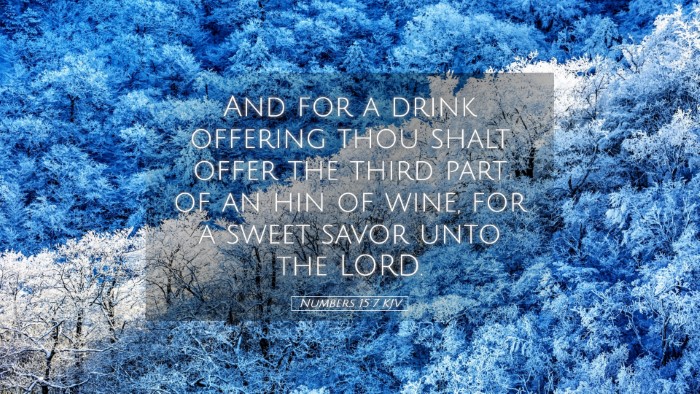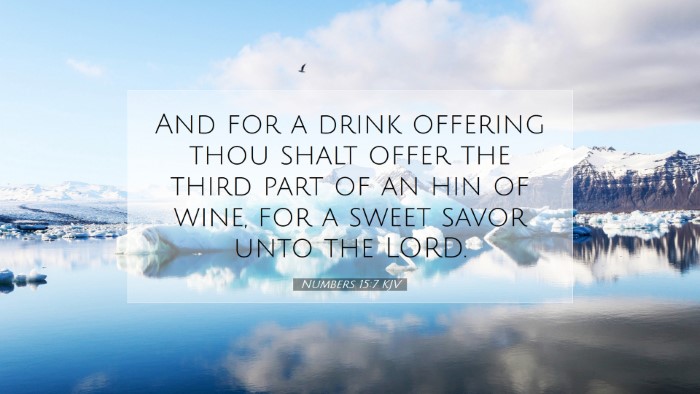Commentary on Numbers 15:7
Verse Overview: Numbers 15:7 states, "And for a drink offering thou shalt offer half an hin of wine for a bald offering, for the sweet savor unto the LORD." This verse outlines a specific requirement for drink offerings in conjunction with burnt offerings as part of the sacrificial system instituted for the Israelites.
Analysis and Insights
1. Context of the Sacrificial System
The book of Numbers is crucial in understanding the transition of the Israelites from captivity to nationhood, marking their journey in the wilderness. Sacrifices and offerings were foundational to their worship and provided a tangible means of expressing devotion to God.
Matthew Henry’s Insight: Henry emphasizes the importance of offerings as an acknowledgment of God's sovereignty and faithfulness. He notes that offerings must be rendered to God with a sincere heart, symbolizing a believer’s commitment and gratitude.
2. The Significance of the Drink Offering
Drink offerings, often accompanying burnt offerings, held deep significance in the worship practices at that time. They represented the outpouring of one's life to God and served as a symbol of joy and thanksgiving.
Albert Barnes’ Perspective: Barnes suggests that wine offered as a drink offering signifies gladness and the abundance of blessings. He draws parallels to how believers today should approach God with joy and thanksgiving for His mercies, establishing a connection between the past practices and present worship.
3. The Meaning of 'Sweet Savor' to the Lord
The term "sweet savor" reflects the notion that these offerings were pleasing to God. They represented a fragrant aroma that would ascend to the heavens, indicating divine acceptance.
Adam Clarke’s Explanation: Clarke elaborates on the idea that the "sweet savor" indicates God's pleasure in the obedience of His people. He notes that the sacrifices were not merely ritualistic but were expressions of the inner attitude of worshippers seeking to experience God’s grace.
4. The Role of Wine in Worship
The use of wine in offerings symbolizes joy and thanksgiving, as wine was associated with celebration in ancient Israel. It serves to remind worshippers of the joy that comes from a relationship with God.
Henry’s Observations: Henry points out that the wine represents the fruits of the earth—a gift from God for which the worshipper expresses appreciation through offerings, demonstrating a holistic form of worship that encompasses both spirit and substance.
5. Application to Modern Worship
As we reflect on Numbers 15:7, it is crucial for pastors and theologians to extract principles that apply to contemporary worship practices. The essence of what was taught in this passage transcends its ceremonial context.
- Understanding Sacrifice: Modern believers are called to bring their own offerings not in the form of animals or wine, but through acts of service, generosity, and worship that please God.
- The Heart of Worship: The emphasis should be on the condition of the heart. Just as offerings must be made with intent, so too should our lives reflect worship in all aspects.
- Joyful Representation of Faith: Just as wine was associated with joy in worship, believers today ought to express their faith and relationship with God through joyful acts of worship and gratitude.
Conclusion
Numbers 15:7 encapsulates profound truths about worship, sacrifice, and the relational nature of God with His people. It urges believers in all ages to engage actively in their faith, understanding that every aspect of their lives can be an act of worship, pleasing to God. Reflecting on ancient practices can enrich modern worship and strengthen the community of faith.


